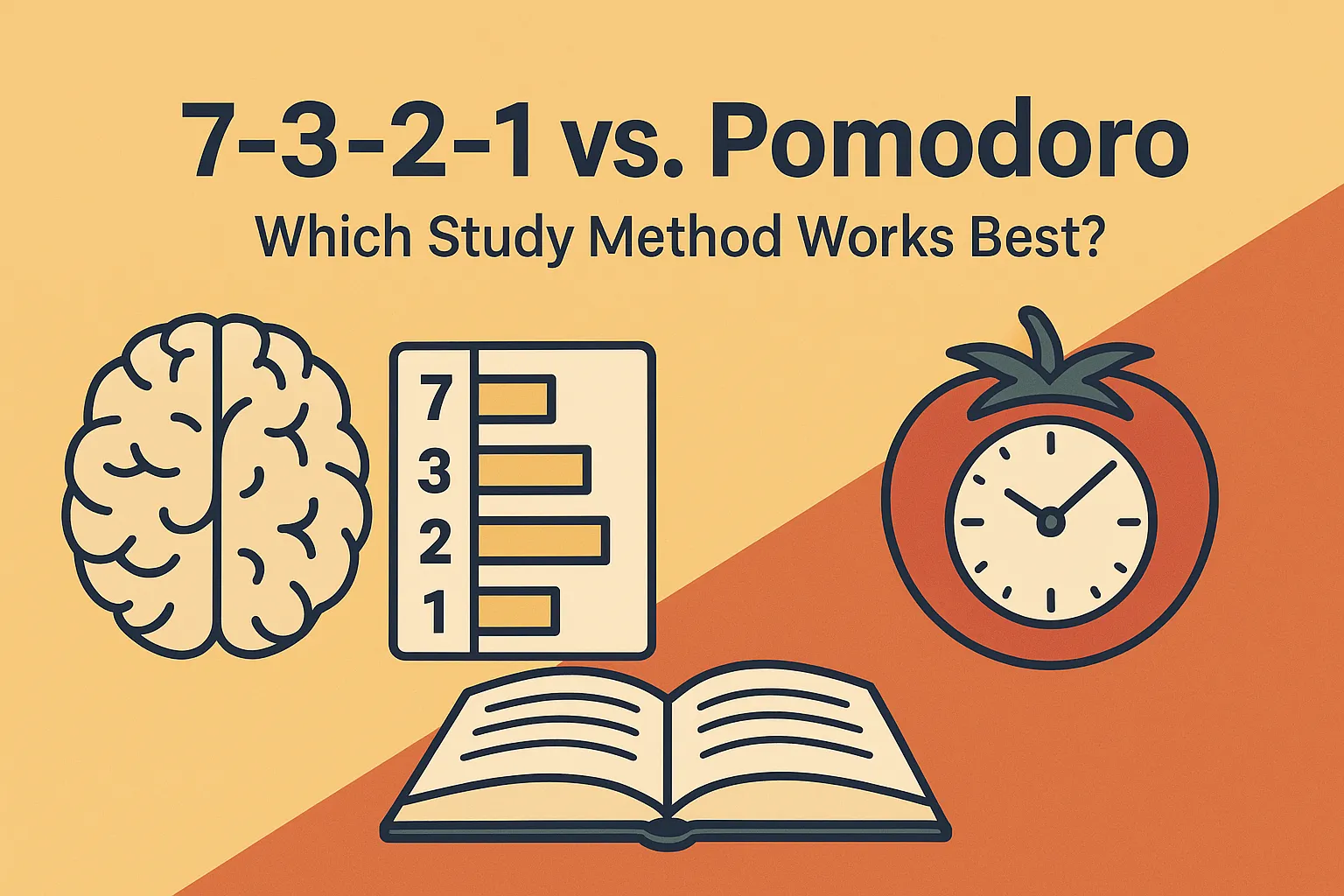🧠 7-3-2-1 vs. Best Study Method for Memory & Focus [2025 and Beyond]
📚 Introduction
In effective study techniques, two methods have garnered significant attention: the 7-3-2-1 Study Method and the Pomodoro Technique. Both are designed to enhance focus, improve memory retention, and optimize study sessions. However, they differ in structure, application, and effectiveness depending on individual learning styles.
Update for 2025:
Based on student feedback, hybrid methods like SmartPomodoro (using 7-3-2-1 inside Pomodoro cycles) are becoming increasingly popular for science and exam prep.
Let's dive into how these methods compare — and which one fits you best. This blog dives deep into both methods, comparing their features, benefits, and potential drawbacks to help you determine which aligns best with your study goals.
🧩 Understanding the 7-3-2-1 Study Method
🔍 What is the 7-3-2-1 Study Method?
The 7-3-2-1 Study Method is a structured approach that segments study sessions into specific time intervals:
- 7 minutes of focused study
- 3 minutes of rest
- 2 minutes of review
- 1 minute of summarization
This cycle is repeated multiple times during a study session, promoting active engagement and reducing cognitive fatigue.
🧠 The Science Behind 7-3-2-1
- Cognitive Load Theory: Reduces cognitive overload by chunking study time.
- Spaced Repetition: Integrates review phases that enhance long-term memory.
- Active Recall: Encourages retrieving info through review and summarization.
✅ Benefits of the 7-3-2-1 Method
- Enhanced Focus
- Improved Memory Retention
- Effective Time Management
- Reduced Procrastination
- Adaptability Across Subjects
⏱️ Exploring the Pomodoro Technique
🔍 What is the Pomodoro Technique?
Developed by Francesco Cirillo in the late 1980s, the Pomodoro Technique is a time management method using a timer to break work into intervals—traditionally 25 minutes of work followed by a 5-minute break.
🧠 The Science Behind Pomodoro
- Focused Work Sessions
- Regular Breaks Prevent Fatigue
- Increased Time Awareness
✅ Benefits of the Pomodoro Technique
- Increased Productivity
- Enhanced Focus
- Reduced Burnout
- Flexibility Across Tasks
⚖️ Comparative Analysis: 7-3-2-1 vs. Pomodoro
| Feature | 7-3-2-1 Study Method | Pomodoro Technique |
|---|---|---|
| Session Length | 13 minutes per cycle | 25 minutes per Pomodoro |
| Break Duration | 3 min rest, 2 min review, 1 min summary | 5-min short, 15–30 min long breaks |
| Focus Strategy | Study + Review + Summary | Focused work with rest |
| Ideal For | Deep learning, memory retention | Task completion, productivity |
| Flexibility | Structured but adaptable | Highly adaptable |
| Tools Required | Timer, study materials | Timer |
🧪 Practical Applications
🎯 When to Use the 7-3-2-1 Method
- Studying Complex Subjects (e.g., Science, Languages)
- Exam Preparation
- Long-Term Learning Goals
🛠️ When to Use the Pomodoro Technique
- Breaking Down Large Tasks
- Beating Procrastination
- Balancing Work and Study
🧰 Integrating SmartExaminers for Enhanced Learning
No matter your chosen method, SmartExaminers amplifies your effectiveness:
- ✅ Curriculum-Based Questions
- 🧾 Auto-Generated Marking Schemes
- 📄 Well-Formatted DOCX/PDF Files
- 🔁 Supports Active Recall
- 🎯 Progress Tracking for Smarter Study Sessions
🧠 Psychological Considerations
📈 Motivation & Momentum
- 7-3-2-1: Builds momentum with mini-milestones.
- Pomodoro: Offers task satisfaction after each cycle.
🧘♂️ Mental Fatigue & Burnout
- 7-3-2-1: Includes reflection + rest = lower cognitive load.
- Pomodoro: Balances work/rest but lacks built-in reflection.
👨🎓 Which One Is Right for You?
| Learner Type | Recommended Method | Why It Works |
|---|---|---|
| Deep Learner | 7-3-2-1 | Promotes understanding + retention |
| Task-Oriented Learner | Pomodoro | Helps check off tasks and stay productive |
| Crammer | 7-3-2-1 | Encourages repetition and summary for quick gains |
| Procrastinator | Pomodoro | Easy-start short bursts overcome resistance |
| All-Rounder | Hybrid Approach | Mixes productivity and reflection |
🧪 Hybrid Approach: The Best of Both Worlds?
Some students blend both methods for superior results.
💡 Example Hybrid Plan
- 25-minute Pomodoro
- First 7 min: Focused Study
- Next 3 min: Rest
- Then 2 min: Review
- Final 1 min: Summarize
➡️ 12 minutes of study + 6 minutes of reflection
➡️ Followed by 5-minute break
This combines Pomodoro's structure with 7-3-2-1's cognitive benefits—a powerful synergy.
🔥 How to Memorize Faster for Exams
To memorize faster, you need a method that supports active recall, spaced repetition, and focused rest.
The 7-3-2-1 method integrates these principles directly by using quick review and summary sessions in every cycle, making it excellent for mastering concepts quickly.
🧪 Study Tips for Science Subjects
Science subjects can be heavy on both theory and problem-solving. Try using 7-3-2-1 when revising biology, chemistry, or physics—reviewing what you just learned after every short burst makes concepts stick better.
Quick Tip: Use diagrams, flashcards, and summary sheets during the review and summary phases.
🧠 Effective Memorization Techniques
Besides choosing the right method, here are other science-backed memorization hacks:
- Teach the concept to someone else.
- Use spaced repetition flashcards (like Anki).
- Use the Feynman Technique with your 2-minute review.
- Sleep well—memory consolidates during REM sleep.
🔁 How to Study and Remember
Don’t just reread—recall. Both Pomodoro and 7-3-2-1 promote chunking study time, but only 7-3-2-1 forces you to summarize and recall after each cycle.
That’s what makes it so powerful for long-term memory.
📢 Final Verdict
There’s no one-size-fits-all approach to studying. Both 7-3-2-1 and Pomodoro offer unique advantages depending on your goals, attention span, and study material.
- If your priority is deep learning and memory retention, go with 7-3-2-1.
- If you're focused on completing tasks or managing time, Pomodoro might suit you better.
- Better yet? Try a hybrid approach and see what works best for you.
🎓 Choose wisely, and let your method empower your mastery!
✨ Bonus Tip:
Pair any of these methods with SmartExaminers for: - Instant practice papers - Custom marking schemes - Active recall integration - Progress tracking that actually helps
📘 Study smart. Not just hard.
 SmartExaminers
SmartExaminers


